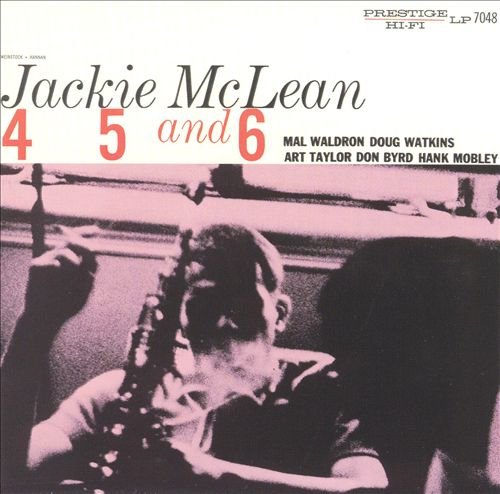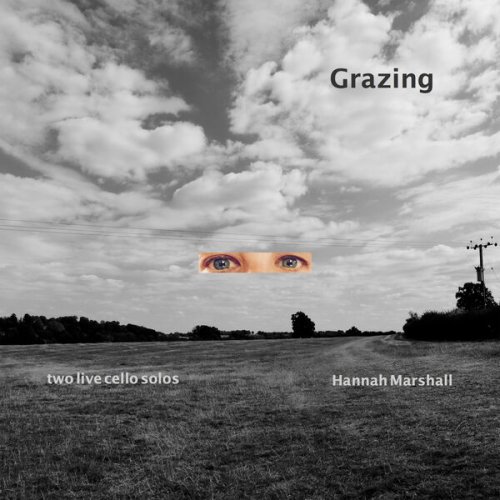Jackie McLean - 4, 5 and 6 (1956)

Artist: Jackie McLean
Title: 4, 5 and 6
Year Of Release: 2007 [RVG Remasters]
Label: Prestige
Genre: Jazz, Hard Bop
Quality: FLAC (tracks+.cue, log, Artwork)
Total Time: 45:19
Total Size: 306 MB
WebSite: Album Preview
Tracklist:Title: 4, 5 and 6
Year Of Release: 2007 [RVG Remasters]
Label: Prestige
Genre: Jazz, Hard Bop
Quality: FLAC (tracks+.cue, log, Artwork)
Total Time: 45:19
Total Size: 306 MB
WebSite: Album Preview
01. Sentimental Journey (Green-Brown-Homer) (9:59)
02. Why Was I Born? (Kern-Hammerstein) (5:16)
03. Contour (Drew) (5:02)
04. Confirmation (Parker) (1:25)
05. When I Fall in Love (Heyman-Young) (5:35)
06. Abstraction (Waldron) (8:02)
In 1956 Jackie McLean was only beginning to assert himself as a true individualist on the alto saxophone, exploring the lime-flavored microtones of his instrument that purists or the misinformed perceived as being off-key or out of tune. 4, 5 and 6 presents McLean's quartet on half the date, and tunes with an expanded quintet, and one sextet track -- thus the title. Mal Waldron, himself an unconventional pianist willing to explore different sizings and shadings of progressive jazz, is a wonderful complement for McLean's notions, with bassist Doug Watkins and drummer Art Taylor the impervious team everyone wanted for his rhythm section at the time. The quartet versions of "Sentimental Journey," "Why Was I Born?," and "When I Fall in Love" range from totally bluesy, to hard bop ribald, to pensive and hopeful, respectively. These are three great examples of McLean attempting to make the tunes his own, adding a flattened, self-effaced, almost grainy-faced texture to the music without concern for the perfectness of the melody. Donald Byrd joins the fray on his easygoing bopper "Contour," where complex is made simple and enjoyable, while Hank Mobley puts his tenor sax to the test on the lone and lengthy sextet track, a rousing version of Charlie Parker's risk-laden "Confirmation." It's Waldron's haunting ballad "Abstraction," with Byrd and McLean's quick replies, faint and dour, that somewhat illuminates the darker side. As a stand-alone recording, 4, 5 and 6 does not break barriers, but does foreshadow the future of McLean as an innovative musician in an all-too-purist mainstream jazz world.


![Marvin Birungi - Soul Vaxnation (2026) [Hi-Res] Marvin Birungi - Soul Vaxnation (2026) [Hi-Res]](https://www.dibpic.com/uploads/posts/2026-02/1771660075_500x500.jpg)
![Hyper Elastic Jinx - We Vote Force Majeure (2026) [Hi-Res] Hyper Elastic Jinx - We Vote Force Majeure (2026) [Hi-Res]](https://www.dibpic.com/uploads/posts/2026-02/1771485115_cover.jpg)


![Stephen Parisi Jr. - Buddy! (2026) [Hi-Res] Stephen Parisi Jr. - Buddy! (2026) [Hi-Res]](https://img.israbox.com/img/2026-02/20/fvrxk8mfalmhx2kjnbwaetofm.jpg)
![Art Pepper - Everything Happens To Me: 1959 - Live At The Cellar (2026) [Hi-Res] Art Pepper - Everything Happens To Me: 1959 - Live At The Cellar (2026) [Hi-Res]](https://www.dibpic.com/uploads/posts/2026-02/1771405170_fcwg7jmt6mou1_600.jpg)
![Freysteinn - Thoughts (2026) [Hi-Res] Freysteinn - Thoughts (2026) [Hi-Res]](https://img.israbox.com/img/2026-02/20/v51kb7e32wkdjbts45lwsh18u.jpg)